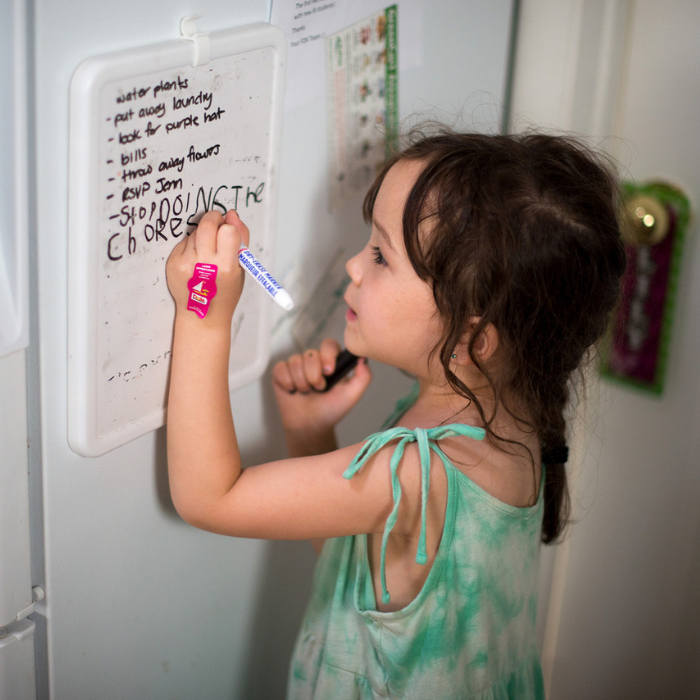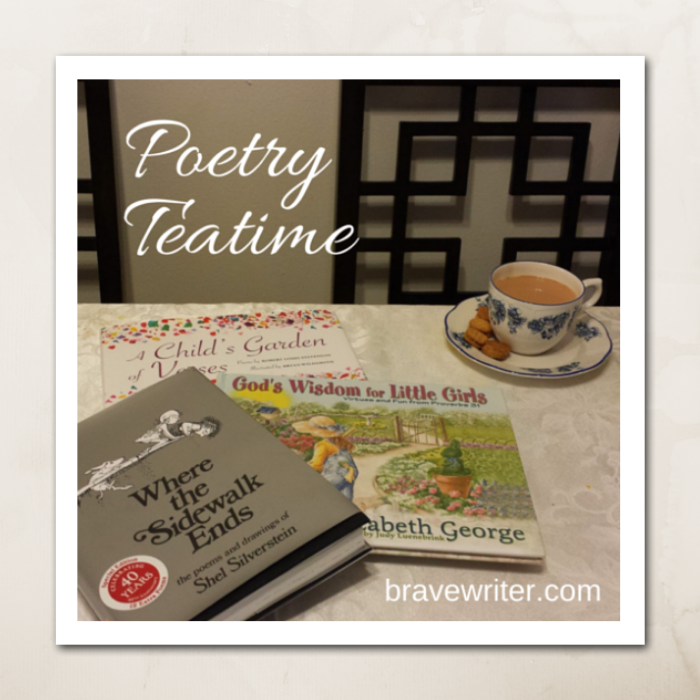
Think of an ongoing chore that you’re tired of doing. Now write a letter sharing why you need a break from that activity. Be convincing! Give at least three good reasons.
New to freewriting? Check out our online guide.

Think of an ongoing chore that you’re tired of doing. Now write a letter sharing why you need a break from that activity. Be convincing! Give at least three good reasons.
New to freewriting? Check out our online guide.
Posted in Friday Freewrite | Comments Off on Friday Freewrite: Take a break
When I began Brave Writer (Jan 2000), I had one goal—help parents help their kids to write without fear. My initial scribbled outlines of possible directions for The Writer’s Jungle had notes about paragraphing, descriptive writing, narrative versus expository writing, and more.
One morning, I got up to read my notes and wilted. I knew that wasn’t what was needed and I certainly didn’t want to write it. Kids weren’t struggling with writing because parents had yet to read the definitive explanation of what constitutes a paragraph.
Parents weren’t frustrated by their children’s childish errors in spelling, punctuation, handwriting, and grammar because they didn’t know how to correct the mistakes.
Rather, parents were frustrated because all those explanations in the programs they already owned weren’t resulting in lively, enthusiastic writing from their kids, with visibly improving mechanics. Tears, anger, boredom—a lack of confidence about what the results meant (were their kids writing well enough?).
Meanwhile all the books I read about writing for my adult writing life had helped me become a much better writing coach to my own children.
I realized: The murky process of generating writing had not yet been adequately addressed for parents at home working with their own children.
The manuals I read showed “sample paragraphs” that weren’t even well written (organized, yes; but dull, lifeless). They taught methods like: “Here’s a sentence in three words. Now add an adjective to make it longer.” Some of them gave such a long script of instructions, any chance for the child’s natural voice to show in the writing was gone before the pen hit the page.
As I wrote more and more about writing and parenting, it struck me that this new writing resource ought to enhance the empathetic connection between parent and child (creating emotional safety for writing risks) while giving the parent-child team tools to help them excavate the inner life of the child and get that to paper.
The Writer’s Jungle is my earliest attempt to express all that information—those goals. I wrote it in my late 30s at a point in my writing career where I was working with non-writers every day—growing and expanding their writing for publication. I spent a lot of energy helping adults find their writing voices. I never once explained what constitutes a paragraph to them.
I didn’t envision The Writer’s Jungle being a “curriculum” in the traditional sense. I assumed parents had scads of writing prompts in their various homeschool curricula for English and history, or school assignments they needed to supervise and support at home.
These parents needed a set of tools (like a corkscrew or can opener) to access the language living inside their kids, without prompting tears, resistance, and pain. I imagined a parent reading The Writer’s Jungle a chapter at a time, even moving around it like a reference book, if they wanted to, using it to help them help their kids write their assignments!
It never occurred to me that anyone would find it a challenge to use The Writer’s Jungle!
It was designed so simply!
When anyone suggests that the “program” is not “organized,” it startles me a bit.
It doesn’t follow a specific set of steps. Programmatic writing instruction is the reason so many kids don’t like writing, and so many adults still lack confidence as writers!
Imagine teaching kids to speak via “program” or “schedule.” Imagine helping a child learn to walk with a curriculum, or learn to sew by tackling a pattern and working through each skill without having ever used a sewing machine!
Writing grows organically first, as would-be writers are introduced to processes that help them learn to express themselves.
Once a writer is freely self-expressing, applying those skills to writing projects is as natural as giving an oral report once a child is a fluent speaker.
It’s been 20 years since I wrote the first draft of The Writer’s Jungle. It deserves a revision (fingers crossed: within the next couple of years) if only to add all the amazing writing and experiences our families have shared with us!
Ultimately Brave Writer has widened and deepened over the years—our offerings are vast and there is so much good free information on the website and blog (check the sidebar!), you can get really far with us without spending a penny!
I felt a need to write a little apologetic for our old battle axe: The Writer’s Jungle. Even though there are passages in it that I’d rewrite in a hot minute (clunkers and overstatements, humor that was funnier in 2000 than now), my message hasn’t changed.
Writing is first and foremost an interior look—pairing language with thought. Writing is about becoming able and facile in this process—with greater and greater linguistic dexterity. It’s exploring the murky, non-linear process of committing ideas to language and language to paper.
Writing benefits from partnerships—with parents or teachers or friends or editors who give content-centered feedback with the heart and goal of enhancing, enriching, and expanding what is there.
There are pain-free processes that support that partnership. These are in The Writer’s Jungle, all of our products and classes, and 100 other writing books written by other writers, not specifically written for homeschoolers.
It’s my hope that you will spend your money and time wisely—taking advantage of all we offer through Brave Writer for free—purchasing what helps you feel brave and competent to facilitate this non-linear process with your kids.
I still love the heart, message, and methods of The Writer’s Jungle. I stand by them.
To all of you who advocate for Brave Writer out there in homeschool discussion board land, thanks for helping to get the real message out. You humble me and move me with your stories.
To sum up—The Writer’s Jungle is a compendium of processes and wisdom to help parents partner with kids and to help kids find their writing voices. That’s it!
I appreciate you. Happy planning! Happy writing!
Posted in The Writer's Jungle, Writing about Writing, Young Writers | Comments Off on In Defense of the Writing Process

August 3 – August 28
The WHOLE family
ONE tuition!
Break into writing this year the easy way:
popcorn and chatting about movies.
FINDING NEMO (2003, G), directed by Andrew Stanton and Lee Unkrich. A tiny clownfish sets out on a big journey to find his son.
CHICKEN RUN (2000, G), directed by Peter Lord and Nick Park. An escape adventure set on a chicken farm in 1950s England.
A CAT IN PARIS (2010, PG), directed by Jean-Loup Felicioli and Alain Gagnol. A Parisian cat with a nocturnal life as a cat burglar’s aide is called to heroism when the girl he lives with is endangered.
FANTASTIC MR. FOX (2009, PG), directed by Wes Anderson. Mr. Fox really is fantastic, but he can’t help raiding the local farmers’ larders, which leads to a high-spirited adventure.
Posted in Online Classes, Webinars | Comments Off on Double your pleasure!

We are having a terrific time at our Poetry Tea Parties.
At first, I was having a hard time finding a tablecloth and tea set that I really loved that would make it special. I finally realized we could do it a little less fancy, and still enjoy a delightful time together. We even had Chick-Fil-A as our snacks at one of our poetry tea parties.
Daddy was even able to join for our most recent tea, and we all took turns picking a poem to read from one of our poetry books.
Thank you for the lovely idea!
~Leslie
Posted in Poetry Teatime | Comments Off on Poetry Teatime: Terrific

How do you make a plan for your kids that takes into account their creativity, imaginations, interests, and quirky personalities, all while hitting academic objectives?
The traditional model of school is tempting and many of us attempt to bring it home (calendars, time slots, lesson planners). The toddlers are less amenable to the schedule and often times the flu or carpet cleaning or pregnancy messes with the schedule anyway!
The flip side is our wish to see learning flourish without our heavy-handed directing—children learning in a pool of light by the window. An “unschooling” vision of learning—as if by magic!
Somewhere between these two approaches to home education is the “sweet spot.” Most parents prefer some evidence they can measure that learning is happening and most kids prefer to pursue their interests (any interests) without interference.
The goal, then, is a homeschool routine—practices that repeat, that highlight or feature particular subject areas, that allow for incremental progress in specific skill sets (like math and reading), and a daily rhythm that everyone comes to know as “daily life together.”
Within the routine is space for flights of fancy, charging down a path to a new insight or experiment, becoming absorbed in a particular line of inquiry for an indefinite amount of time, trips to the zoo and art museum, and time to do nothing but play!
The “Sweet Spot” in homeschool is to toggle between flexibility and structure—but holding both loosely—not gripping either one too tightly as though they will save you from educational shipwreck. Some seasons call for more structure (even outside classes!) and other seasons call for more freedom to explore, unwind, recover, or deeply dive.
You don’t have to balance these two poles perfectly each day or even each week. Being aware of the possibilities that each one offers is enough—and then adjusting your expectations and choices accordingly.

Top image by dierk schaefer (cc cropped, text added)
Posted in Homeschool Advice | Comments Off on The Sweet Spot

I’m a homeschooling alum -17 years, five kids. Now I run Brave Writer, the online writing and language arts program for families. More >>
IMPORTANT: Please read our Privacy Policy.















